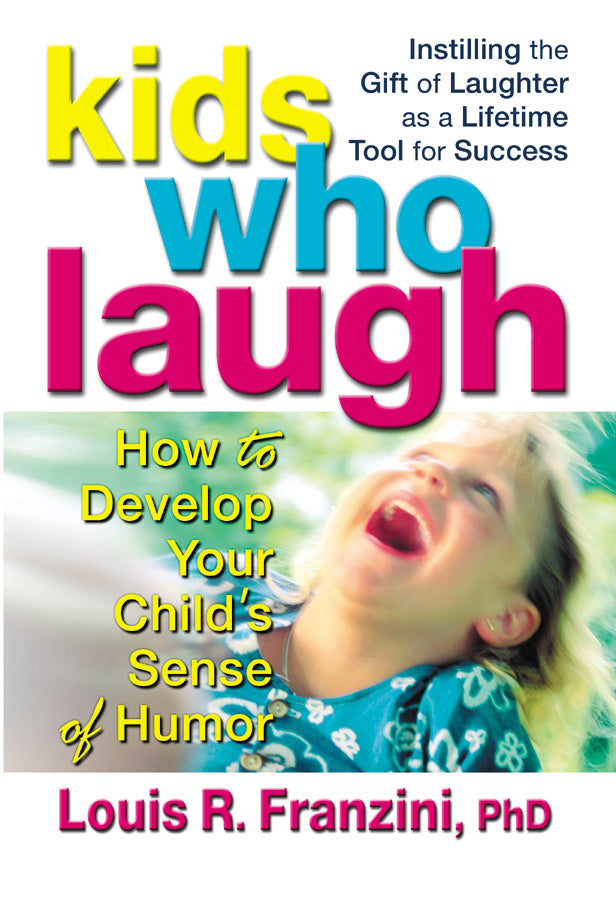While some children are born with an innate sense of humor, for most kids, humor is a learned behavior. Kids Who Laugh is the first book to examine the psychology of humor in children and explore the many benefits that this characteristic has to offer, including self-confidence, coping skills, creativity, self-control, and more. Most important, it offers the actual tools that parents can use to give their child the gift of laughter.
Louis R. Franzini received his PhD in clinical psychology from the University of Pittsburgh. Currently, he is a professor of psychology at San Diego State University in California, where he has taught for over twentyfive years.
Contents
Acknowledgments
A Word About Gender
Introduction
1. All About Humor
2. Characteristics of Children’s Humor
3. Play Smiles and Laughter
4. Developing Your Child’s Humor Skills
5. Encouraging Your Child to Create Humor
6. Potential Abuses of Humor by Children
7. Humor Use by Special Needs Children
8. Jest for Teachers (& Parents Too)
9. Using Humor Resources
Conclusion
References
Suggested Readings
Suggested Websites
Index
"Describing how essential it is to nurture a sense of humor, Franzini gives specifics on what's amusing to infants, preschoolers, and older children...a thorough and convincing book."
Introduction
A good sense of humor is one of the most desirable personality characteristics a person can develop. A sense of humor can be honed to become a personal asset that lasts a lifetime. It is the quality we seek most often in our friends, our mates, and our children. Funny people are enjoyable to be around and become the preferred companions of people of all ages.
Parents want their children to be healthy and happy. Conscientious expectant mothers take their prenatal vitamins faithfully every day to ensure the health of their babies. After birth, caring parents diligently provide for their children’s physical needs. They cover outlets with plastic safety caps and place gates across stairways. They serve nutritious meals. They schedule regular pediatric checkups. They enroll their children in ballet classes, gymnastics, Little League, and the like so that they can stay in good physical shape. The list of things that parents do for their children to ensure that they grow up healthy goes on and on. What they don’t do, in far too many cases, is seek out specific learning experiences that will promote their children’s personal happiness, such as helping them to develop a good sense of humor.
Many parents do not realize that they can help their children develop a sense of humor. They think it’s all a matter of chance. But, luckily, it’s not. There is conclusive evidence that children’s appreciation and use of humor are learned. In fact, humor development begins with parents’ early attempts to coax smiles out of their newborns. Unfortunately, most people have no idea how to continue this process as their children grow so that they can eventually create humor and use it socially in positive ways. Fortunately, there are specific techniques and strategies that you can apply to nurture your child’s sense of humor—whether your child is an infant, a toddler, one who has just started school, or a preteen.
Why should you make a conscious effort to promote this quality in your child? Because a well-developed sense of humor is a genuine asset to any child and helps ensure a strong, positive self-image. A child who enjoys and remembers a joke or riddle and passes it on to others feels an enormous personal accomplishment and establishes friendships at the same time. Making others laugh is extremely rewarding to children (as it is to all of us).
Humor can also be used as a coping device to help children overcome shyness or being teased. Rather than fighting—or retreating into a shell—a child with a well-developed sense of humor is more likely to gain acceptance and make friends. Kids with problems, such as a speech defect or a physical handicap, can make special use of their humor skills to be genuinely accepted by their peers. Robin Williams, Jay Leno, Molly Shannon, and many other professional comedians credit their ability to cope with the stresses of growing up or being seen as “different” to a good sense of humor.
Kids Who Laugh is not intended to train future show biz comics, however. It is designed to introduce the many positive effects a well-developed sense of humor has on children and to teach you how to help your child cultivate this desirable characteristic. Kids Who Laugh is all about showing kids how to have fun by enjoying the humor of others, and it’s about helping kids enjoy the process of creating humor for themselves and for their friends and families. This is not a joke book or a collection of funny stories for you to read to your child. In fact, it will not necessarily be a very funny book to read (although that’s hard for me to admit). In this book, drawing on my expertise and experience as a clinical psychologist and father of three, I tell you what to do to encourage the development of a sense of humor in your child, how to do it, and where to get help. I discuss specific family games, improvisational exercises, resources, and more, which enable both you and your child to practice and hone your humor skills.
Chapter 1 of Kids Who Laugh provides you with an overview of humor. It describes the great nature versus nurture debate—are we born with a sense of humor or can it be learned? Then it goes on to discuss what a sense of humor is and the qualities of a humorous outlook, and briefly touches upon some theories of humor. Most important, it discusses the many advantages of a good sense of humor in kids. Chapter 2 describes the categories of children’s humor and age-related stages of humor development, and winds up with a discussion of the use of humor in children’s literature, television, and movies.
Chapter 3 of Kids Who Laugh discusses play, smiles, and laughter and their respective roles in children’s humor, and covers the many benefits of laughter on the body. In Chapter 4, you’ll learn how to go about developing your child’s humor appreciation skills—lowering social barriers, demonstrating your own appreciation of humor, and much more. Then in Chapter 5 comes the really fun stuff: humor-creation exercises. You and your child are sure to experience a lot of laughs while participating in these suggested activities. Chapter 6 covers a more serious topic—the potential abuses of humor by children, such as laughing at others and their mistakes, and how that can be hurtful and damaging to relationships.
Chapter 7 of Kids Who Laugh discusses the role of humor in and with special needs children, specifically how humor can help such children cope with a world that can sometimes be intolerant. If you’re a teacher who would like to encourage kids’ humor in your classroom, Chapter 8 is for you. It includes classroom activities that you can organize to help promote the use of humor by your students. (This chapter contains some useful information for parents, too!) Finally, Chapter 9 identifies helpful humor resources—which are more numerous than you might think—and provides you with criteria you can use to judge these resources.
The main goal of Kids Who Laugh is to promote the development of a sense of humor in children, which, in turn, will serve them well throughout their lives. Truly happy people enjoy the journey through life, including some unexpected trips along life’s inevitable and numerous detours. “Kids who laugh” are fun to be with and have lots of fun themselves. It’s safe to conclude that these are also happy kids who will grow into kind and lighthearted adults. I hope that you will use the guidelines and techniques presented in Kids Who Laugh to make living with your child the great fun that it should be.





